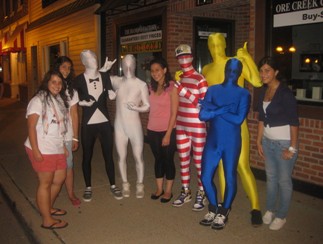A symposium entitled “Bible, Land, and our Theological Challenge: A Presbyterian Conversation” was held in October with key speakers presenting views on biblical perspectives on the land and the Palestinian-Israeli situation. See the schedule of speakers below and watch the video.
| 9:00AM | Welcome, introductions, statement of purpose, prayer | |
| 9:30AM-10:20AM | “Kairos Palestine and Interfaith Relations in North America” | Rev. Dr. Said Ailabouni,ELCA Pastor, La Grange IL, Former director of ELCA office on the Middle East |
| 10:30AM-11:20AM | “Biblical interpretation and Old Testament Land Theology Today” | Rev. Dr. Eugene March,Old Testament Profesor Emeritus, Louisville Presbyterian Theological Seminary |
| 11:30AM-12:20PM | “Biblical interpretation and New Testament Land Theology Today” | Rev. Dr. Gary Burge,Professor of New Testament, Wheaton College and Graduate School |
| 12:30PM | Lunch and discussion: catered in the Presbyterian Center. Registration includes cost of lunch. | |
| 1:45PM – 4:30PM | Panel Discussion | Moderator: Darrell Yeaney, former university Campus Minister in Kansas, California and Iowa; Founder with his wife Sue of the Congressional Accompaniment Project to Israel/PalestineSpeakers: Said Ailabouni, Gene March, Gary Burge(see above)National Staff:Rev. Dr. Christian T. Iosso, Coordinator, Advisory Committee on Social Witness Policy (PCUSA)Rev. Dr. Charles A. Wiley, III, Interim Director, Theology & Worship, PC(USA)IPMN members:Rev. Katherine Cunningham, Co-Executive Director, New Horizons Associates, Counseling and Consultation, New Jersey; a past moderator of the Committee on the Office of the GA; Vice Moderator of IPMN.Professor Nahida Halaby Gordon, Schools of Medicine and Nursing, moderator of the National Middle East Presbyterian Caucus, officer and member of the Steering Committee of IPMNRev. Dr. Donald Wagner, Research Professor for Interfaith Engagement, Eastern Mennonite University and former Professor and Director of the Center for Middle Eastern Studies North Park University, Chicago, ILRev. Raafat L. Zaki, Transitional Synod Executive, Synod of the Covenant. He was educated in the Middle East, Asia, & the USA and has held three pastorates, two GAMC positions, and two synod positions. |



